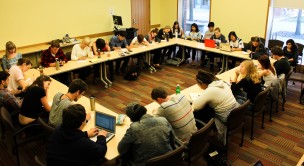Campus groups focused on mental health organized a series of workshops about maintaining wellness.
From the evening of Saturday, Oct. 4 to Sunday, Oct. 5, students gathered for a series of workshops and events related to cultivating healthy life practices. The series, titled “Night and Day of Wellness: Cultivating Practices for a Healthy Mind,” was hosted by Active Minds, Writers’ Bloc, WeSlam, WesBAM!, and the University’s Counseling and Psychological Services (CAPS). Miranda Orbach ’15, Caroline Catlin ’15, Sonia Max ’17, Lily Myers ’15, and Kate Weiner ’15 served as the event’s primary organizers.
“I think the biggest goal was to make students aware of their own wellness and encourage everyone on campus to take some time out of their day and put their wellness first,” Orbach said. “Mental illness is something that is very common, particularly on college campuses. We do not talk about it nearly enough.”
This is the first year that the University has hosted a wellness event of this scale. The planners built off Active Minds’ Silver Ribbon Luncheon Series, launched in September 2013. The luncheon series aimed to broaden campus-wide discussions about mental health by holding weekly events discussing different stigmas and other issues surrounding mental health.
“Last year we…had a few luncheons focused on wellness,” Orbach said. “This year, we turned it into two days, and I hope that we will continue this tradition.”
The event began on Saturday with an evening poetry slam in the World Music Hall. The slam featured three well-known slam poets—Rachel McKibbens, Sierra DeMulder, and Safia Elhillo—each of whom presented pieces about mental health and its effects on everyday life. DeMulder, a two-time National Poetry Slam champion, graduated from New York University’s Gallatin School of Individualized Study with a concentration in “Poetry as a Tool for Therapy.” She has since written “The Life and Times of Susie Knuckles” and appeared on the slam poetry television show, Verses and Flow.
Max emphasized the personal nature of the slam and its stress on mental health.
“The poetry slam…touched on lots of emotional subjects like cultural heritage baggage, death, difficult relationships, self harm, depression and different mental illnesses,” Max wrote in an email to The Argus. “It was two hours of hearing each poet’s feelings and thoughts.”
In addition to performing at the poetry slam, McKibbens and DeMulder hosted two writing workshops on Sunday. Other workshops included activities such as yoga and meditation. The variety of activities was intended to ensure that all attendees found a wellness practice that resonated with them.
“Poetry, yoga, writing, and meditation are just a few ways that we, as the organizers, felt that we practiced our own wellness,” Orbach said. “We wanted to give a sampling for people so that if you weren’t comfortable with one you could still try another.”
Max, who taught one of the yoga classes held on Sunday, spoke to the power of yoga within wellness practice.
“For me and many others, practices like yoga and meditation are very helpful in feeling more balanced and brightening mood and decreasing anxiety,” Max wrote. “Being able to express emotion is another cathartic and helpful practice.”
Helen Doyle ’17, who attended Sunday’s yoga session, stated that yoga helps her maintain wellness amidst her stress.
“Yoga for me is a time when I can be within my body without worrying about the stress of being a college student,” Doyle said. “The classes provided at Wesleyan by student instructors are a great way to practice yoga without the high cost of traditional studio.”
Although many campus groups such as Active Minds, WeSupport, and CAPS are working to increase conversation about mental health, Orbach believes that there is still room for improvement in the way that the University approaches mental health.
“There is definitely work to be done on this campus,” Orbach said. “We need to keep starting conversations about mental health on this campus with our friends, professors, deans, and the entire Wesleyan community.”
